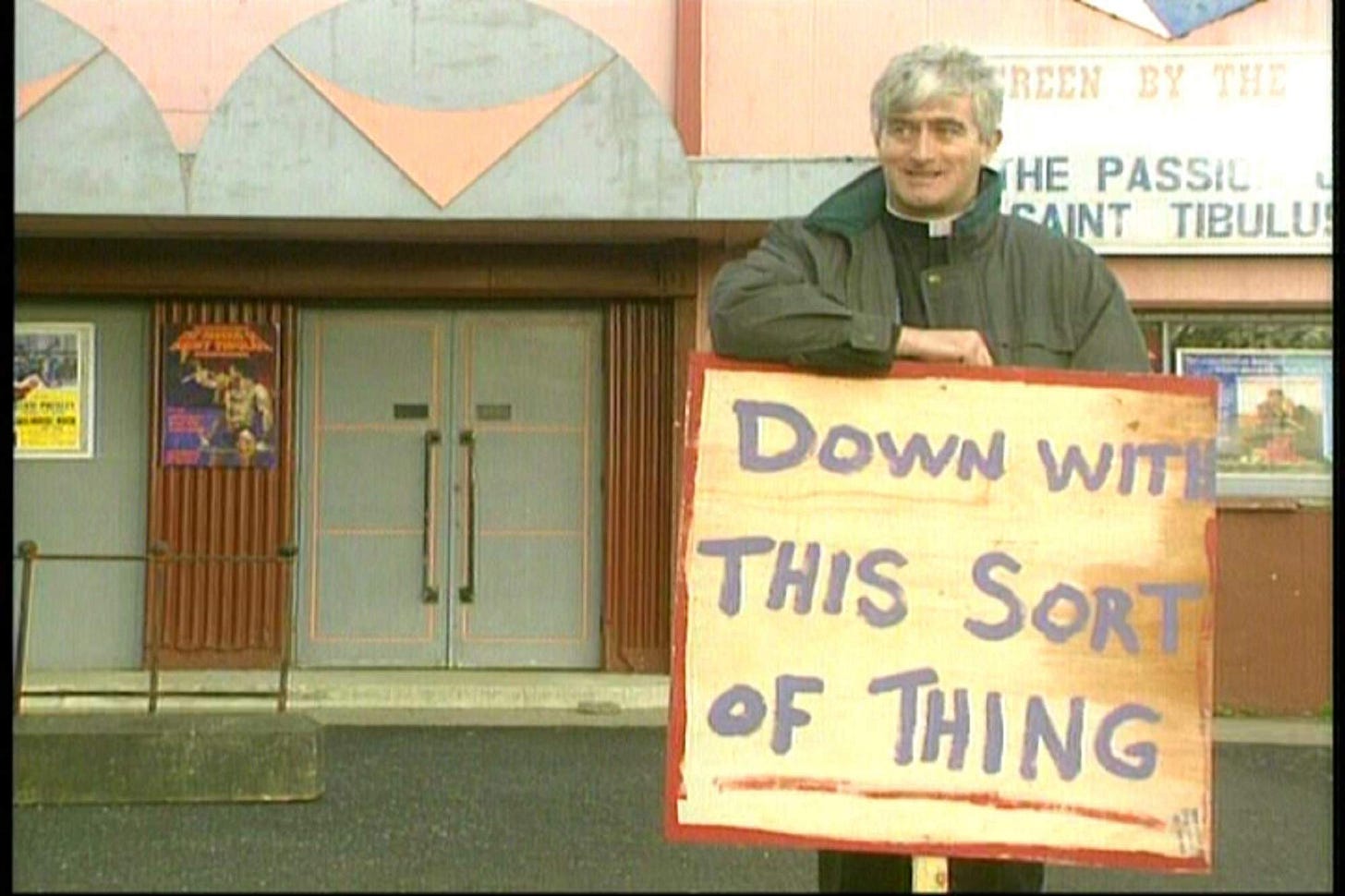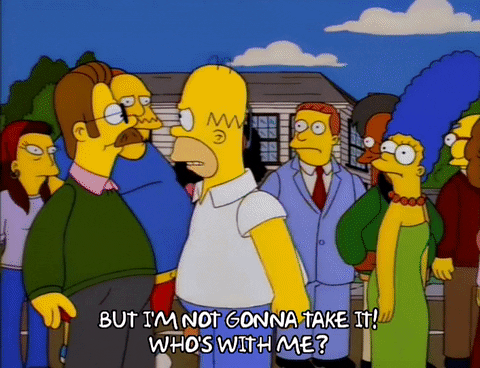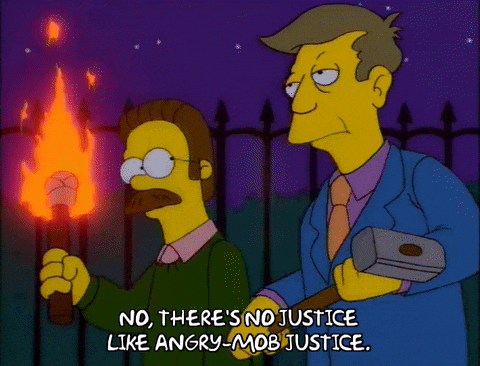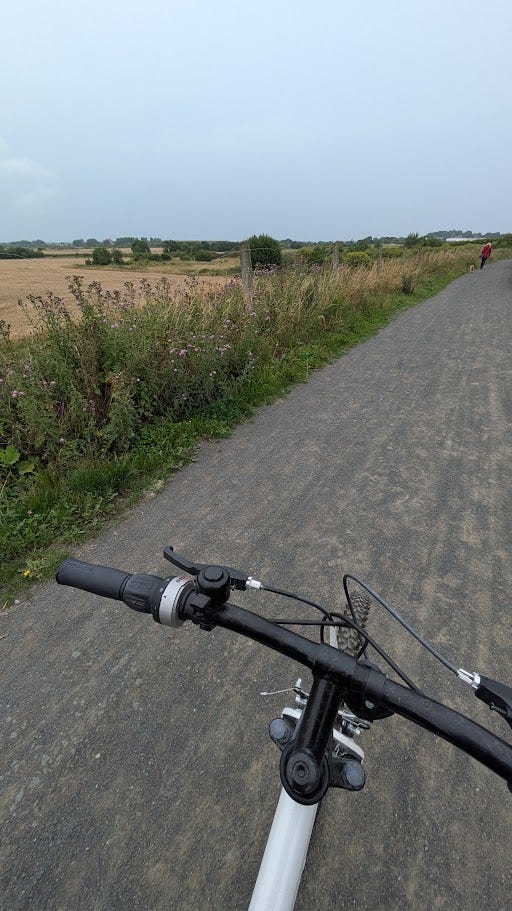Why Brits refuse to protest
On hyperindividualism and our lack of spines
When I first visited Barcelona back in 2012, I vividly remember sitting in a park, drinking a can of Estrella, eating supermarket bread and cheese, and chatting shit.
There was a noise in the distance, and it was getting louder.
The sound of voices chanting something I couldn’t quite make out.
Then, around the corner on the main road, a huge crowd appeared, holding signs and waving flags.
It was a protest.
I can’t remember specifically what they were protesting, which is unsurprising because once I spent longer in the city, I started to realise that protest was a daily occurrence in Catalonian life.
As a child, I spent a lot of time holidaying in France and witnessed similar events many times in both small towns and big cities. The French were always fighting for some cause or other. They had fires in their bellies, and nothing would stop them from taking to the streets.
Fast forward to 2025 and swim across La Manche, and we’re still very much living in ‘unprecedented times’. The UK Cost of Living Crisis continues, something which really shouldn’t be prevalent enough to be a proper noun.
Our government is actively supporting Israel, which is nearly two years into a genocidal massacre in Gaza in which over 60,000 people have died since October 7th, 2023. Our elected leaders are making welfare cuts and silencing anyone who fails to stand in line.
We’re all angry and posting frantically online: “Enough is enough” and “Free Palestine” on just about every Instagram story. But look away from the black mirror in your palm, and life goes on as usual.
You’re likely to see the odd Palestine flag in someone’s window, and a few gathered at the Monument in town… but, in general, we’re not really very angry about these things which we should be very, very angry about. But why?
Firstly, Britain doesn’t have the same relationship with protest as countries like Spain and France. Culturally, we don’t see the point in it. In fact, a 2023 YouGov survey found that 73% of people think protests don’t make a difference. In the same year, 53% of French people said they wanted to see a Yellow Vest-type ‘social explosion’ of protest.
For the French and Spanish, protest is in their blood. In Britain, we have nothing to compare to the 1789 French Revolution and 1936 Spanish Civil War. We have never risen up against the ruling class in any meaningful way, at least not since 17th century.
We accept our place in the world. Why? I think there are a few answers to that, likely because we maintain a superiority complex from the days of the Empire, and also since we lack any meaningful culture of our own, we cling into the monarchy and the ‘stiff upper lip’ British values that give us any semblance of belonging in a world where, let’s face it, everyone hates us.
Secondly, we’re scared. The proscription of Palestine Action has led to over 100 arrests, mostly of peaceful protesters. Just Stop Oil protesters spent months, even years, in prison for their actions— after being dealt longer sentences than rapists or pedophiles.
As normies, we don’t feel equipped to go to a protest, at least I don’t. What if I’m arrested? Who will run my business or raise my child? This is a real fear that many people have when it comes to attending peaceful demonstrations against the genocide in Gaza. It’s ming-boggling but true.
And thirdly, perhaps the most pertinent point here, is that we Brits are, by our very nature, individualists. Strikes and protests inconvenience us, and we don’t typically care about why people are taking to the streets, or refusing to work. For example, Just Stop Oil is famous for wreaking havoc with their protests, bringing major motorways to a standstill for hours at a time. Many protesters were charged with offenses, and even spent time in prison for their actions.
But in March 2025, Just Stop Oil announced plans to disband and focus its efforts on less adversial tactics. Why? Because they achieved their goals: there would be no more new oil and gas licenses issues by the UK government.
Starmer’s government maintains that the policy is in no way related to the protests… but who was keeping the topic in the news, week after week? Who was sparking discussions about oil and gas licencing online and in the real world? They say all publicity is good publicity, and JSO lived and died by that motto.
In Adam Curtis’ latest BBC documentary series, Shifty, he explores the rise of hyperindividualism in the UK from the start of Thatcher’s Britain until the early ‘00s. Curtis assembles a collage of archival video footage to tell the story of how Britain became so obsessed with self-interest, from the villification of immigrant populations to the privatisation of the water industry.
Through a careful manipulation of the narrative from collectivism, i.e. ‘we’re all one’ to individualism, we’ve allowed ourselves, as a nation, to become obsessed with our own interests. For example, turning social housing or water from a human right to a profitable institution, we shift the focus away from creating a better life for all, into creating the very best life for the chosen few.
And that’s why British people won’t protest en masse.
We just don’t care about anything more than ourselves.
In this section, I summarise topics dominating the online discourse this week.
GB News dropped a trailer for a horrendously racist documentary that you’d honestly thing was straight out of an Alan Partridge skit, you can watch it here.
Nick Cave gave 2,000 books to a Brighton charity shop, including novels with plane tickets as bookmarks and even notes in the margins. The shop has refused to sort out the collection and is, instead, leaving it to customers to find surprises in each edition.
Left-wing YouTube essayist Contrapoints finally addressed her views on Israel and the war in Gaza with a strange series of Instagram stories dangerously close to ‘what aboutism’.
I woke up the other morning and decided I wanted to own a bike. I haven’t had one for years, so I picked up a cheap one on Marketplace and took it for a spin. It was so fun. Funny how things like ‘going for a bike ride’ are commonplace when we were kids, but now it’s simply a means of getting from one place to another.
I’m here for doing more things for the fun of doing it, and not just to get somewhere else.
Things I’ve enjoyed this week:
📚 My Name is Leon by Kit De Waal - Absolutely outstanding book from the POV of a 9-year-old boy who finds himself and his baby brother in foster care.
📺 Dept. Q (Netflix) - Addictive if not a bit hammy, heavily influenced by Slow Horses.
📽️ The Teachers’ Lounge (Prime Rental) - Unsettling German film about a teacher working at a school with a petty thief problem.
📽️ Censor (Prime Rental) - Excellent horror film about a woman working for the film censor who starts to experience strange visions and happenings.
That’s all from me,
Ellen x
💌 About this email
I’m Ellen, and I write about mental health for the chronically online. I am a freelance copywriter, strategist and web designer, and I work from home with my husband, Craig, at Content By The Sea. We have two rescue greyhounds, Potter and Harmony, and a toddler.
I started this newsletter in March 2020 and have sent over 200(!) emails; currently, I have over 1,300 subscribers. I write about a wide variety of topics, including diet culture, my love of running, jealousy, my life falling apart, mam guilt, and this dystopian world we all live in.
💛 How you can support me
If you like reading my weekly emails, you can give me a kickback in one or more of the following ways:
📨 Share this post
📬 Subscribe for free (if you haven’t already!)
💬 Leave a comment on this newsletter










How funny to read your thoughts just now when a couple of hours ago a woman came up to me as I walked out of Gail's with a coffee and said "Do you know they support Israel?" She was fuming and low-key expecting me to throw away the coffee on the spot, but at £4 that's a luxury I cannot afford.
Beyond this anecdote, and being from Spain myself and with a sister living in France for over a decade, I confirm that protesting isn't engrained into British culture and I agree with you that it probably has to do a lot with individualism and the motto of "minding your own business," which is not per se a bad thing but it can lead to disconnection and prevent people from realising they do have power to change things when they are part of something bigger than themselves.